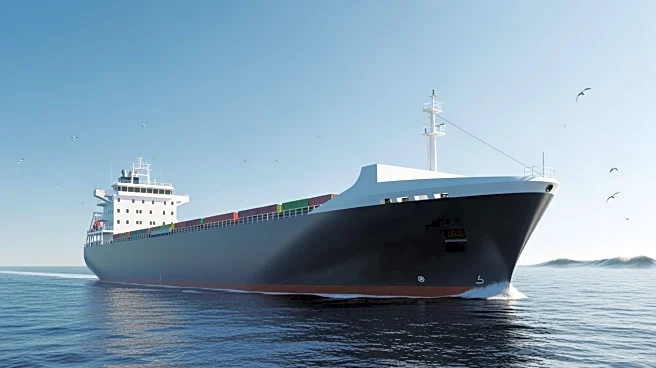What's Happening?
Shipping giant A.P. Moller-Maersk has reported a third-quarter operating result that exceeded expectations, prompting the company to raise the lower end of its full-year profit outlook. Despite a 44% annual decline in underlying earnings before interest,
taxes, depreciation, and amortization (EBITDA), Maersk's Q3 EBITDA reached $2.69 billion, surpassing the $2.58 billion anticipated by analysts. The company now forecasts its annual EBITDA to be between $9 and $9.5 billion, an increase from the previous guidance of $8 to $9.5 billion. CEO Vincent Clerc highlighted the company's solid performance across its business segments and emphasized its readiness to adapt to changing market conditions to ensure supply chain stability for its customers.
Why It's Important?
Maersk's revised profit forecast and strong quarterly performance underscore the resilience of the shipping industry amid fluctuating market conditions. As a major player in global logistics, Maersk's ability to exceed profit expectations and adjust its financial outlook reflects its strategic positioning and operational efficiency. This development is significant for stakeholders in the shipping and logistics sectors, as it may influence market dynamics and investment decisions. The company's adaptability in maintaining supply chain stability is crucial for businesses reliant on international trade, potentially affecting pricing, delivery schedules, and overall economic activity.
What's Next?
Maersk's updated profit forecast suggests continued focus on operational efficiency and strategic investments to navigate market challenges. The company may explore further digitalization and innovation to enhance its service offerings and customer experience. Stakeholders, including investors and industry partners, will likely monitor Maersk's performance closely, assessing its ability to sustain growth and profitability. Additionally, potential shifts in global trade policies or economic conditions could impact Maersk's operations and financial outlook, prompting further adjustments in strategy.
Beyond the Headlines
The shipping industry's performance, as exemplified by Maersk, highlights broader economic trends and challenges, including supply chain disruptions and geopolitical tensions. Maersk's adaptability and strategic foresight may serve as a model for other companies navigating similar challenges. The emphasis on maintaining supply chain stability reflects the critical role of logistics in global commerce, with implications for trade policies and international relations.














